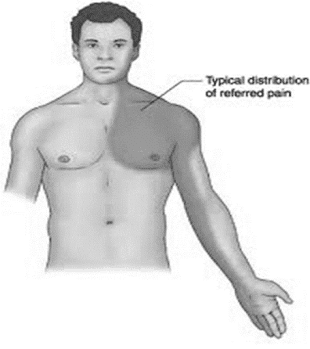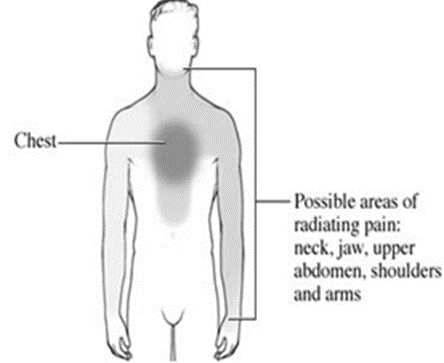Angina pectoris & Myocardial infarction (MI)
Content
• Angina pectoris
• Myocardial infarction
Objectives
At the end of this PDF Notes, student will be able to
• Explain the etiology involved in angina pectoris and myocardial infarction
• Discuss the pathogenesis of angina pectoris and myocardial infarction
• Describe the complications associated with angina pectoris and Myocardial infarction
Angina pectoris
• Discomfort due to transient myocardial ischemia
• Heart muscle does not receive enough blood (nutrient & O2) resulting in chest pain
Etiology of Angina Pectoris
• Atherosclerosis of large coronary arteries
• Heart valve disease
• Thickening of heart muscles
• Coronary artery spasm
• Hypertension
Symptoms of Angina Pectoris
• Gripping of central chest pain
• ↑ shortness of breath on exercise
• Sense of heaviness or numbness in the arm, shoulder, elbow or hand usually on the left side
• Constricting sensation in the throat
• Mild ache to severe pain
• Sweating and fear
Pathogenesis and Types of Angina
• Imbalance between myocardial oxygen demand and supply
Stable/ Typical/ Exertional/ Classical Angina
• Provoked by physical exertion
• Heaviness, squeezing and sensation of constriction in the chest
• Pain subsides on resting
• Depression in ST segment of ECG
• No elevation in the blood enzyme level if no myocardial injury
Variant/ Prinzmetal Angina
• Pain at rest
• No relationship with physical activity
• Occur due to coronary artery spasm
• Spasm – due to release of vasoconstrictor by mast cells in coronary artery
• Attacks are painful, occur between midnight & daily morning
• ST segment elevation in ECG
• Patient respond well to vasodilator like nitroglycerine
Unstable/ Atypical/Cresendo/ Preinfarction Angina or Acute coronary insufficiency
• Frequent onset of pain for longer duration
• Occurs often at rest
• Indication of myocardial infarction
Microvascular angina
• Chest pain , no apparent coronary artery damage
• Poor functioning of blood vessels of heart, arm or legs
• May occur during exercise or at rest
Myocardial infarction
• Myocardial infarction / Heart attack results from complete obstruction to blood flow in the coronary artery
• Imbalance in supply and demand of O2 to myocardium
• Underlining cause – coronary artery disease
Symptoms of myocardial infarction
• Severe chest pain
• Sweating
• Chest pain radiating through jaw, shoulder, arms and back
• Epigastric discomfort with or without nausea/ vomiting
• Sproathy and blood stained sputum
• Dizziness, weakness, Anxiety
• Irregular heart beat
• Heart burn & indigestion
Etio-pathogenesis of Myocardial infarction
Atherosclerotic causes
• Accounts for 75% of cases
• Fatty streak deposits on the coronary artery
• Endothelium develop into an atherosclerotic
plague depending on the presence of risk factors
• Risk factors – HT, DM, Smoking, Hyperlipidemia
• Plaque progression, proliferation and
disruption of integrity of blood vessel
• Results in narrowing off coronary artery &
MI
Non atherosclerotic causes
• Accounts for 10% of the causes of MI
• Coronary vasospasm
• Inflammation of arteries
• Coronary embolism
• Development of thrombosis
• Injury
Complications of Myocardial Infarction
• Cardiac arrhythmia
• Congestive heart failure
• Cardiogenic shock
• Rapture of heart
• Mural thrombosis
• Thromboembolism
Summary
• Angina is the discomfort due to transient myocardial ischemia where heart muscle does not receive enough blood (nutrient & O2) resulting in chest pain
• Myocardial infarction / Heart attack results from complete obstruction to blood flow in coronary artery
• Causes of angina and MI include Atherosclerosis of large coronary arteries, heart valve disease, thickening of heart muscles, coronary artery spasm, hypertension
• Occurs mainly due to the imbalance in supply and demand of O2 to myocardium
Also, Visit: Pathophysiology Notes







